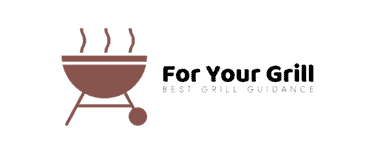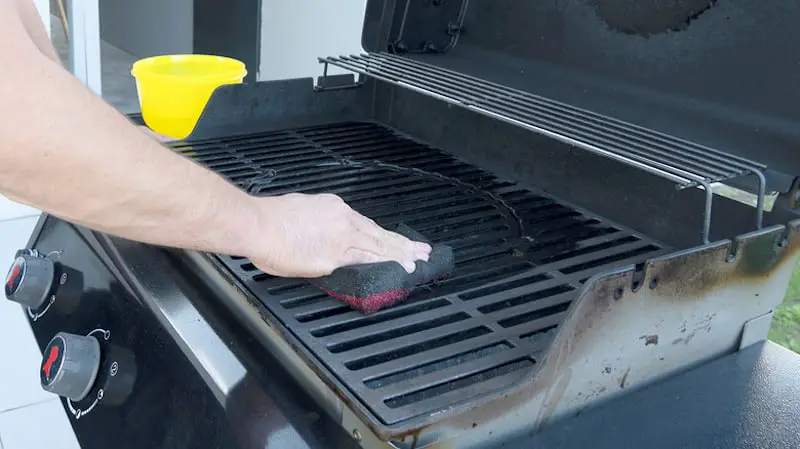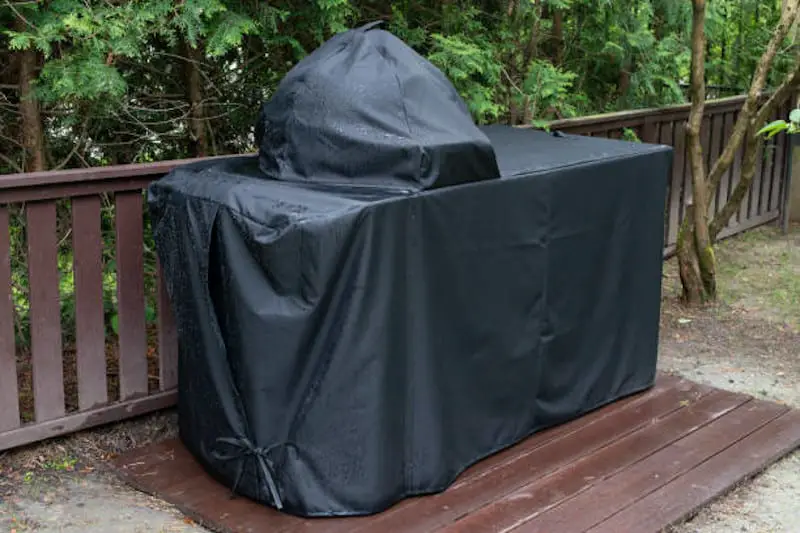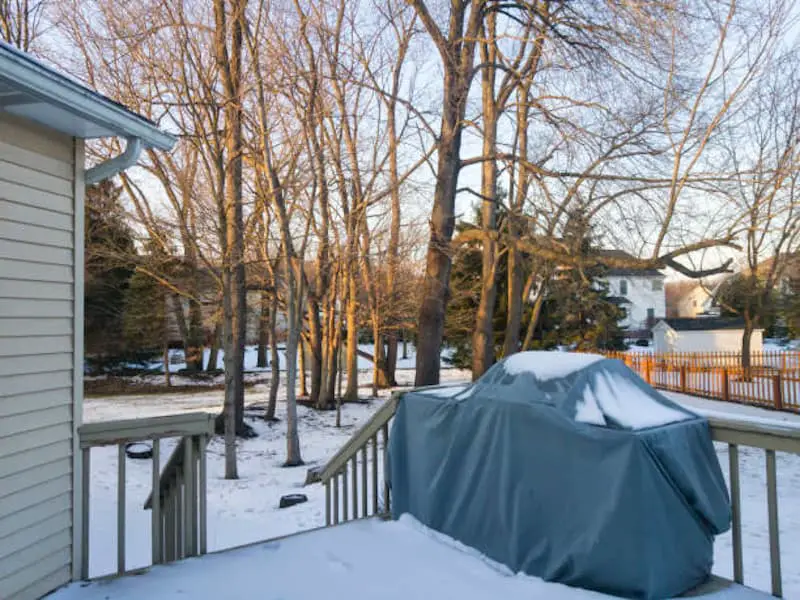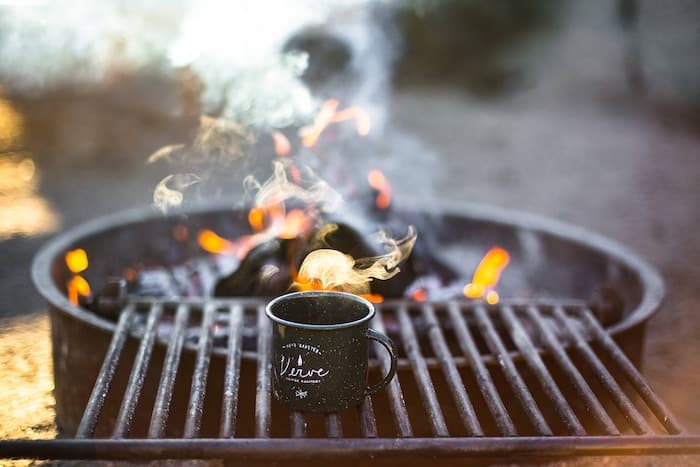
The sight of mold on your grill can easily spoil your spring mood. Instead of cranking up the fire, you have to get rid of the mold first. This is not a good experience especially since you have waited for months, all through winter to enjoy a smoked meal. That said, however, there is no need to panic. The growth of mold on your grill is a normal phenomenon. Therefore, if you do not use your grill frequently or you constantly have to stop grilling depending on the weather this article is for you.
So, what causes mold in a grill? Generally, molds like to grow in moist and damp areas. On a grill, molds grow due to moisture or poor air circulation within the grill. These mold-breeding conditions are usually a result of placing a lid on your grill. While else the lid prevents rust on your grill, it may also lead to the growth of molds on the same grill. When the smoker is covered with a lid, there is poor air circulation. As such, moisture that may occur on the grill does not dry up completely. Eventually, this encourages the growth of molds. Besides, grease on grills also creates a suitable condition for the growth of molds
If you have experienced molds on your gill, keep reading to find out more about the causes of this mold. This article will also highlight how to prevent the growth mold on your grills, how to get rid of mold on your grills, and how to clean your grill before storage among other grill and mold-related questions.
- Causes of Mold on Grills
- How to Prevent Molds from Growing on a grill?
- What if the molds have already occurred?
- How to Clean Your Grill?
- How to Make a Homemade Grill Cleaner?
- Precautions to Consider When Removing Molds from your Grill, Cleaning and Storing it
- Importance of Cleaning your Grill
- Related Questions
Causes of Mold on Grills
To start, as mentioned above, 9 out 10 times when mold appears on your grill is usually due to the use of a lid. Primarily a lid is used to preserve the outside of your grill. It keeps it from rusting, exposure to dust, moisture and dirt. However, the same lid prevents proper circulation of air and traps moisture within it, which are some of the causes of molds on grills.
First with a lid on your grill, most of the air is stagnant. If anything, only the open space has a continuous flow of clean air. In the end, this creates a good condition for the growth of molds that thrives on poorly ventilated surfaces.
Second, if you have a lid on your grill, in case of the occurrence of moisture, the moisture will be trapped within the grill. In this case, the lid covers the moisture preventing it from the full exposure to evaporation that is important to dry it. The result is the growth of molds and rust, which do well in the presence of humidity or moisture.
So does this mean you should not cover your grill? Well if you have a stainless grill grate or your grill is well painted, you do not have to cover it. The stainless nature and paint guarantees you the grill will not rust; which is the main reason why you need to cover your grill. Nonetheless, if you do not have a stainless grill, you might consider leaving a small open area when you cover the gill. This can be done using a wooden stand that will hold the lid slightly open. With this open area, the grill is properly aerated and any moisture is exposed to evaporation causing it to dry up quickly.
Other than that, another alternative to covering your gill with a lid is placing it under a shade during storage. With this, you do not risk the occurrence of mold because of moisture or poor air circulation.
Apart from using a lid, leaving grease on your grill may also create suitable conditions for the growth of molds. Grease functions the same way as moisture. As such, even without covering your grill, if you leave grease on your grill after cooking, you risk the growth of molds on it.
How to Prevent Molds from Growing on a grill?
It is quite embarrassing when guests see you cleaning up molds from your grill. It does not help that everyone is excited about the feast of barbecued steaks, burger and hot dog, that is just about to commence. You do not have to subject yourself to this humiliation while you can choose to prevent the growth of molds on your grill. Besides, it is cheaper than having to get rid of the molds after they appear. The following is a detailed procedure to prevent molds from growing on a grill.
The first step is to superheat your grill. In this case, you might have to add fresh charcoal to boost the temperatures of the grill. The idea is to burn the entire food residue that has accumulated throughout the grilling. Therefore, you need the highest possible temperatures.
Once all the food remains are burnt, use a plastic puffy knife to scrape the burnt food, grease, and excess charcoal away. This eliminates the chances of growth of molds due to grease.
After the interior of the grill is clean, store the cooker in an open dry place. Also, make sure that all the vents are open and dry so that moisture is not trapped.
If you follow this procedure and you avoid covering your cooker, then you will have significantly reduced the chances of growth of molds on your smoker.
What if the molds have already occurred?
Chances are you are reading this article because you already have molds taking over your grill. Well, do not worry; we have prepared a detailed step-to-step procedure to help you get rid of molds on your grill.
Step 1: Put on a facemask before getting rid of the molds. This is because disturbing the molds without a mask especially for your nose may cause you to fall sick after inhaling the mold spores.
Step 2: Get rid of every charcoal, ceramic, briquettes, lava rock and any other porous material from the grill.
Step 3: Fire up the grill. Make sure the heat is as high as possible to kill the molds and burn the accumulated grease. You will have to put a lot of fuel in this step.
Step 4: Allow the grill to cool
Step 5: After the grill has cooled off, scrape off everything on the grill that you can get your hands on. It is recommended you use a wire brush or a pressure washer for the best results.
Step 6: After you are done scrubbing and scraping, use hot soapy water to clean every part of the grill. When you are satisfied that the entire grill is clean, rinse the smoker thoroughly.
Step 7: The last step is to fire up your grill one last time. This is done to completely burn any residual mold, soap, or grease and make sure your grill is mold-free and ready for the cookout.
How to Clean Your Grill?
It is recommended that you clean your grill regularly, preferably after every cookout. A clean grill reduces the chances of molds growing on it. However, just because your grill does not have molds, it does not completely write off the need to clean your grill. A dirty grill may result in several things that may disturb your cooking fun moments.
When cleaning, you will need a wire brush and soapy water for cleaning a standard grill. However, make sure you read the manufacturer’s instructions on cleaning your specific grill before embarking on the process. The following is a simplified procedure of how to clean your grill.
Step 1: Always make sure you clean your grill after use. This is when it is hot making the cleaning process easier and more efficient. In case the grill has cooled down you may heat it again to obtain the best results.
Step 2: Remove the gas line and start mixing warm soapy water in a bucket.
Step 3: Remove the grates on the grill and using a wire brush and soapy water, scrub and wash them respectively. If you have a charcoal grill go directly to step 6
Step 4: Remove the frame shield, lave stones, briquettes or any other barrier between the burner and the grates. Once you can access the burner, unclog it by getting rid of any ash or briquettes residue using a soft wire brush. If you are satisfied it is clean, set the burner back to its place.
Step 5: Wash the removed flame using the soapy water.
Step 6: Using a wire brush and warm soapy water, clean the interior of the grill. Rinse it once you are sure it is clean.
Step 7: Dry the grill using a dry cloth and fire it up again to make sure you burn any soapy residue, grease or food. This step is also important to ensure that the remaining moisture dries up.
Related article: How Often Should You Clean A Grill?
How to Make a Homemade Grill Cleaner?
In some cases, the soap used to clean your grill may stick on the grates and later traces of soaps may be present in your food. This is not such a good experience. It, therefore, has pushed people to purchase grill-cleaning products depending on a person’s preference. The good news is, you can clean your gill without using soap or having to purchase any special cleaning products. We have discussed below the process of making your homemade grill cleaner.
- Mix white vinegar with water in the ratio of 1:1
- Pour the mixture into an empty spray bottle. Shake the mixture vigorously to make sure it mixes well.
- Use a half meter of aluminum to crush it into a ball
- When cleaning, spray the vinegar mix properly on the grill making sure every corner of the grill is exposed to the vinegar mix.
- Use the crunched aluminum ball to scrub any food remains or grease from the grill
- You may repeat the procedure until you obtain your desired results.
Precautions to Consider When Removing Molds from your Grill, Cleaning and Storing it
- When cleaning your grill do not use any corrosive substance like chlorine. These chemicals are harmful for consumption especially in case traces are left after rinsing your grill. Besides, for ceramic grill, corrosive subsistence will damage the grill’s surface
- During cleaning the flame shield, get rid of the charcoal to avoid wetting it.
- Before burning the molds, keep children away from the grill. This is because exposure to mold spores may cause infection to children.
- If you intend to store your grill indoors, make sure that if you are using a propane grill, the propane tank is stored outside. This reduces the chance of fire outbreaks due to the propane.
Importance of Cleaning your Grill
Now that you understand how to clean your gill and what to use, it is important to understand the significance of cleaning your grill.
- Firstly, a clean grill reduces the chances of growth of molds when it has been stored for long. This is because there is no grease or unnecessary moisture that will encourage the growth of these molds.
- Moreover, a dirty grill can accumulate harmful, carcinogens over time. The chemicals in the carcinogen may be transferred to your grill when you continue to use it without cleaning. In this case, scraping the grease and food residue is not enough. As such, to be sure you get rid of these carcinogens it is recommended that you clean your grill regularly. There are other ways to prevent the occurrence of carcinogens on your grill. For starters, you can avoid grilling processed meat. You can also marinate your meat before grilling, use lean meat when grilling or avoid grilling before your meat turns black. Also, keeping the flames at bay may help reduce the occurrence of these toxic carcinogens.
- Cleaning reduces oxidation and corrosion on your grill. Leaving residue of food and grease over a long period may trap moisture within your grill. Eventually, oxidation will occur and your grill will be corroded. If you intend to use a shiny attractive grill, make a deliberate attempt to clean your grill and dry it before storing it
- Cleaning your grill regularly extends its life span as compared to grill that is left with sauces, oils, food remains rust and grease. Therefore, if you want your grill to last for long, clean it regularly. This ensures that all its components including the gas tubes, grates and burner work efficiently.
- A well-maintained clean grill means that the cost of repair and replacement is reduced. For instance, if you do not clean your grill regularly and it ends up rusted, at some point you will have to replace the rusted grates or surface. This creates an additional cost, which would have been avoided by cleaning your grill.
- A clean grill is the first step to making sure you enjoy that distinctive taste of your smoked meal. In case your grill has leftover food and grease, the taste of your food may be altered, beating the need to smoke your food in the first place. Similarly, a dirty grill produces a lot of smoke that will tarnish the taste of your food.
- Clean grills reduce the chances of disease and infections. If your grill is dirty, chances of buildup of disease-causing bacteria and viruses is higher than that of a clean grill. Therefore, since you do not want to expose your family and friend to infections, make a habit of cleaning your grill.
- A clean grill has fewer flare-ups that can sometimes make smoking difficult when they are in large amounts.
- Cleaning your grill both on the inside and out discourages critters from using it as their home during long winters. If you are in a habit of leaving food remains on your grill, chances are that critters like mice have found a home in your grill. Other than that, the food residue is the regular supply of bits for the mice. In the end, during spring you may be in for a rude shock when you find your grill trashed in mice waste or see the mice in your cooker. The best way to avoid such embarrassing scenarios is to clean your grill before storage.
- Finally, a dirty grill is not attractive to both you and the visitors. In extreme cases, it may dull the cookout, which was initially meant to be a fun time.
After cleaning your grill, always make sure that you dry it. As mentioned above you can use a dry cloth but the final step is to crank the grill and allow the heat to burn for around 15 minutes. If you do not allow the moisture from cleaning to dry, chances are that your cleaning efforts will be in vain. This is because the moisture, over some time, will encourage the growth of molds and rust. I cannot stress the need for drying your grill enough.
Related Questions
How high should the temperatures be to kill the molds? Research has proven that mold can live at temperatures of 60 Degree Celsius. As such, to kill the mold, you will have to hit up the smoker beyond the 60 Degrees Celsius, which translates to 140 degrees Fahrenheit.
Should I use a power wash solution on the ceramic grill? No, do not use chlorine solutions, power wash detergents, wire brush or hard metal scrapers on your ceramic grill. This hard chemicals and tools for scraping will damage the ceramic grill surface. When it comes to ceramic grills, heat is your only option.
What happens if you use a grill with molds? Well, your concern is if molds are harmful. Most molds are harmless. However, do not let their colorful appearance fool you. Molds are of different types and sometimes you may get into contact with dangerous molds in the prettiest of color. These harmful molds carry bacteria with mycotoxins, which are dangerous when consumed and could cause diseases. Therefore, if your grill has molds, take your time to clean off the molds completely. Your health should always come first.
Bottom line, if you want to keep mold away from your smoker, clean your grill after cooking, dry it up completely, store the grill in an open place away from moisture and avoid using a lid as much as possible. Happy cookout!
